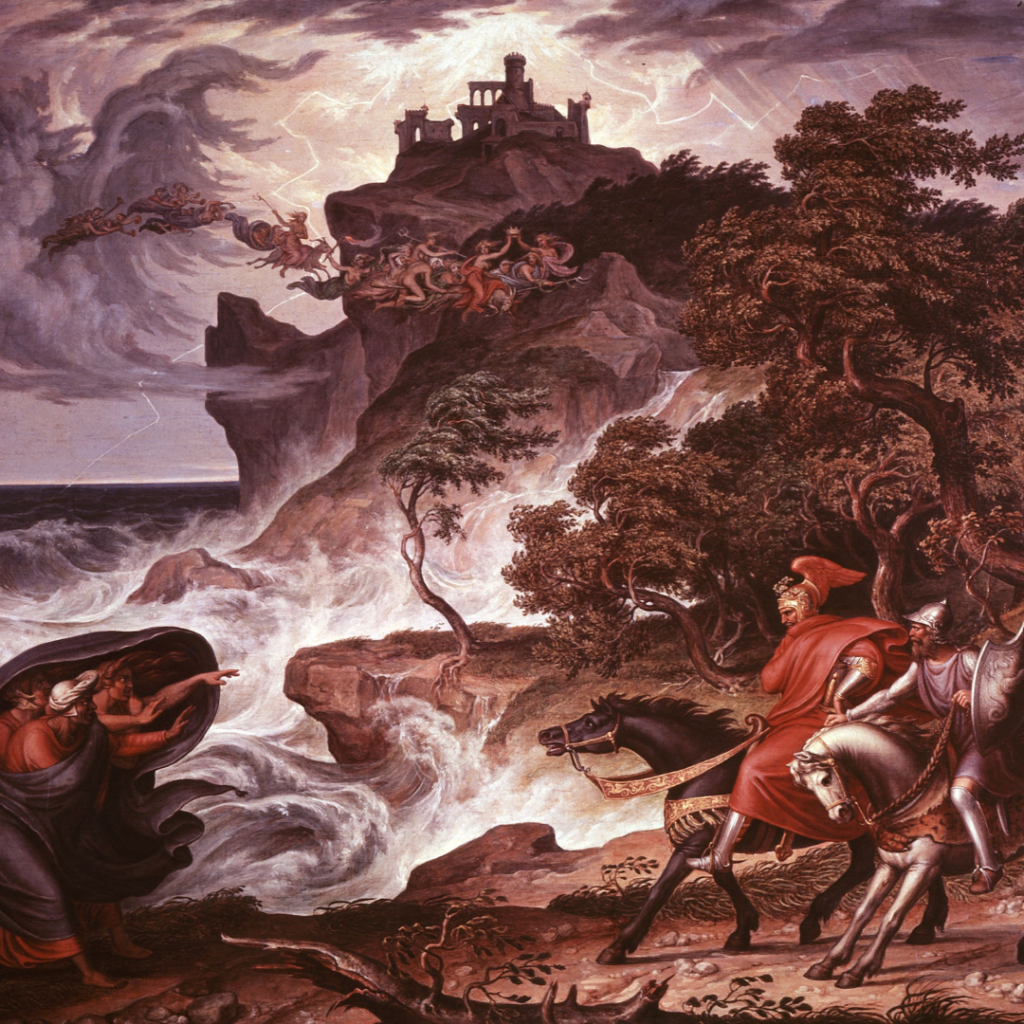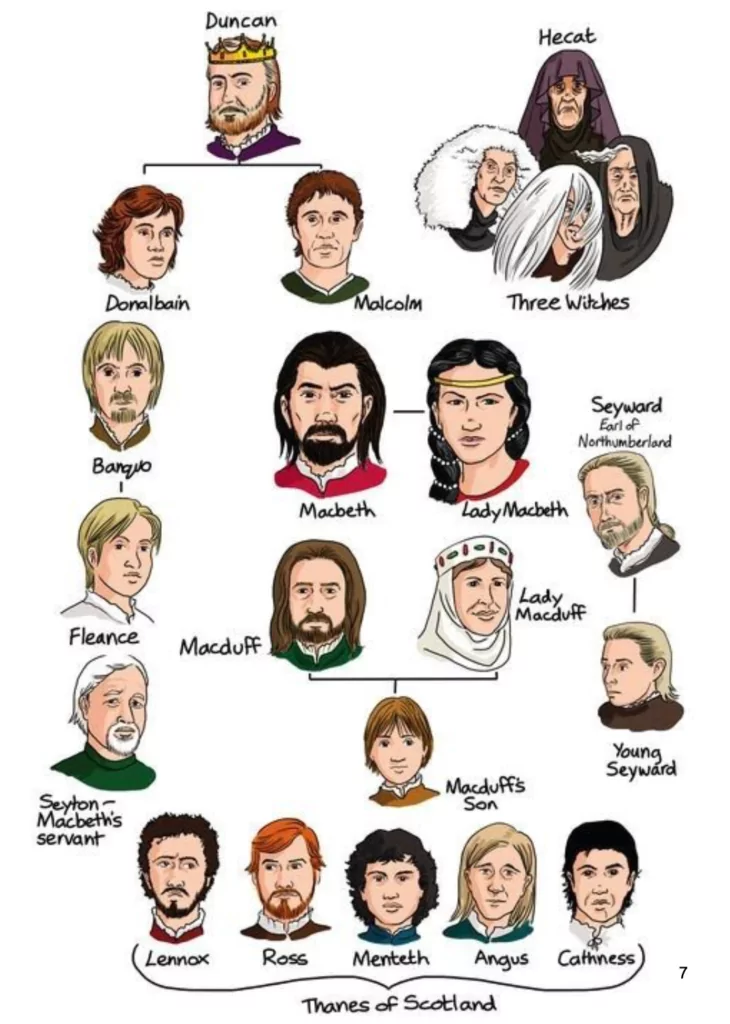The Context of Macbeth
- Written around 1606
- Shakespeare wrote for the theatre during the reigns of Queen Elizabeth I and King James I.
- Shakespeare drew from many sources when he wrote—the Holingshed Chronicles of England was one of these.
- Shakespeare changed several characters to meet the theatrical purpose of the play. In Holingshed’s account Macbeth is older than Duncan, but Shakespeare reverses their ages and Duncan is portrayed as the older of the two.
- Macbeth was written especially for James I and was performed in 1606.
- His plays reflect not only timeless conflicts and resolutions, but a view of the Elizabethan society.
- The thought of unknown or the supernatural was really interesting
- Women were lower than man
- Society standards harshly divided. Upper Class -> Poverty.
Characteristics of Tragedy
A Shakespearean tragedy is a play penned by Shakespeare himself, or a play written in the style of Shakespeare by a different author. Shakespearean tragedy has got its own specific features, which distinguish it from other kinds of tragedies. It must be kept in mind that Shakespeare is mostly indebted to Aristotle’s theory of tragedy in his works. The elements of a Shakespearean tragedy are discussed below.

Characters in Macbeth
Macbeth A captain in Duncan’s army, later the Thane (Lord) of Glamis and Cawdor. When Three Witches predict that he will one day be king of Scotland, he takes his fate into his own hands, allowing his ambition and that of his wife to overcome his better judgement. His bloody reign culminates in a battle against Malcolm and the English forces.
Lady Macbeth The devilish wife of Macbeth, whose ambition helps to drive her husband toward the desperate act of murder. Subsequently, her husband’s cruelty and her own guilt recoil on her, sending her into a madness from which she never recovers.
Banquo A fellow-captain and companion of Macbeth, who also receives a prophecy from the Witches: that his children will one day succeed to the throne of Scotland. This information is sufficient to spell his death at the hands of the resentful Macbeth, who is later haunted by Banquo’s ghost.
Duncan King of Scotland. His victories against rebellious kinsmen and the Norwegians have made him a popular and honoured king. His decision to pass the kingdom to his son Malcolm provokes his untimely death at the hands of Macbeth.

The Witches Three agents of Fate who reveal the truth (or part of it) to Macbeth and Banquo and who later appear to confirm the downfall and tragic destiny of the tyrannical Macbeth.
Fleance Banquo’s son, who, by escaping Macbeth’s plot on his life, will go on to be the father to a line of kings.
Donalbain and Malcolm Duncan’s two sons. Fearful of implication in their father’s murder, they flee Scotland, Donalbain to Ireland and Malcolm to England, where he raises a large army with the intention of toppling the tyrant Macbeth.
Macduff A thane (nobleman) of Scotland who discovers the murdered King Duncan. Suspecting Macbeth and eventually turning against him, Macduff later flees to England to join Malcolm. When Macbeth arranges the murder of his wife and children, Macduff swears personal revenge.
Lennox, Ross, Menteth, Angus, Caithness Thanes of Scotland, all of whom eventually turn against the tyrannical Macbeth.
The Porter, the Old Man, the Doctors Three commentators on events, all of whom have a certain degree of wisdom and foresight. The Porter hints at the Hell-like nature of Macbeth’s castle; the Old Man associates the murder of King Duncan with the instability of the natural world; the Doctors recognize disease and disorder even though they cannot cure it.
Macbeth Essay Questions
- Assess how to use of characterisation has been used by Shakspeare to express the underlying themes within the play.
- Demonstrate to what extent Shakespeare expresses what is important to himself, the values of the time, and how this play reflects our world today.
- To what extent have the main themes in the text been consistent with other interpretations. How have these texts been similar and/or different in expressing the underlying themes.
- To what extent has Shakespeare demonstrated the implications of unchecked ambition through the use of characterisation in the play, Macbeth?
- Discuss Macbeth’s visions and hallucinations. What role do they play in the development of his character?
- Is Macbeth a moral play? Is justice served at the end of the play? Defend your answer.
- Discuss Shakespeare’s use of the technique of elision, in which certain key events take place offstage. Why do you think he uses this technique?
Macbeth Study Guide Questions
Act One
- What is the point of the first scene literally and in reference to the whole play?
- What does Duncan call Macbeth when he hears Macbeth has defeated Macdonwald?
- Who is sentenced to death?
- What do the witches predict in I.iii for Macbeth? For Banquo?
- What news does Ross bring Macbeth?
- Banquo, like Macbeth, is surprised that the witches have predicted Macbeth’s new title.
He is, however, leery. What does he say about the motives of the “instruments of
darkness”? - Malcolm describes Cawdor’s last moments before execution. What is Duncan’s reply?
- Macbeth says, “Stars, hide your fires, Let not light see my black and deep desires.” What
are Macbeth’s desires? - After Lady Macbeth reads the letter, what does she tell us is her opinion of Macbeth,
and how does she plan to help him? - What is Lady Macbeth’s “prayer” to the spirits after she learns Duncan is coming”?
- What advice does Lady Macbeth give Macbeth when he arrives home?
- What are Macbeth’s arguments to himself against killing Duncan?
- What arguments does Lady Macbeth use to convince Macbeth to commit the murder?
- What is Lady Macbeth’s plan?
Act Two
- What is Macbeth’s lie to Banquo about the witches’ predictions?
- What is the signal Lady Macbeth is to give Macbeth to let him know that she has taken
care of the guards (grooms)? - What excuse does Lady Macbeth give for not killing Duncan herself?
- After Macbeth kills Duncan, he goes to Lady Macbeth and is concerned about not being
able to say “Amen.” What is her advice to him? - Then, Macbeth is worried about hearing a voice saying, “Macbeth does murder sleep.”
What does Lady Macbeth then tell him to do? - Why won’t Macbeth take the daggers back to the scene of the crime?
- Who was knocking?
- What three things does drinking provoke?
- How does Lennox describe the night, and what is Macbeth’s response?
- What did Macduff discover?
- Macduff says, “Oh, gentle lady, ‘Tis not for you to hear what I can speak. The repetition,
in a woman’s ear, Would murder as it fell.” What is ironic about this? - What excuse or explanation did Macbeth give for killing the guards (grooms)? What
is his real reason? - Why do Malcolm and Donalbain leave?
- Why does Ross not believe Malcolm and Donalbain were responsible for Duncan’s
murder?
Act Three
- Why does Macbeth want Banquo and Fleance dead?
- What is Macbeth’s plan for killing Banquo and Fleance? Does it work?
- Macbeth says, “The worm that’s fled Hath nature that in time will venom breed, No
teeth for the present.” What does that mean? - Who (what) did Macbeth see at the banquet table?
- How does Lady Macbeth cover for Macbeth at the banquet? What excuses does she give
for his wild talk? - Who else was missing from the banquet table (besides Banquo)?
- Macbeth says, “I am in blood Stepped in so far that should I wade no more, Returning
were as tedious as go o’er.” What does he mean? - What does Hecate want the witches to do?
- What does Lennox think about Macbeth, Fleance, and Duncan’s sons?
Act Four
- Witch 2 says, “By the pricking of my thumb, Something wicked this way comes.” Who
comes? - What is Macbeth’s attitude towards the witches this time?
- What four things did the witches show Macbeth? What does each show/say? What is
Macbeth’s reaction? - Macbeth says (about the witches), “Infected be the air whereon they ride, And damned
all those that trust them!” What is Macbeth, in effect, saying about himself? - Where is Macduff?
- Why does Macbeth have Macduff’s family and servants killed?
- Why does Lady Macduff’s son say liars and swearers are fools?
- Malcolm says, “Angels are bright still, though the brightest fell. Though all things foul
would wear the brows of grace, Yet grace must still look so.” What does that mean? - Macduff says, “Oh, Scotland, Scotland!” Why?
- What news does Ross bring to Macduff?
Act Five
- What do the doctor and gentlewoman see Lady Macbeth doing? What do they decide
to do about it? - What does Macbeth want the doctor to do for his wife?
- What trick does Malcolm use to hide the number of men in his army?
- Malcolm says, “And none serve with him but constrained things Whose hearts are
absent, too.” What does that mean? - What is Macbeth’s reaction to Lady Macbeth’s death?
- What is Macbeth’s reaction to the news that Birnam Wood is moving?
- Who first fights Macbeth? What happens?
- Macbeth says to Macduff, “But get thee back, my soul is too much charged With blood
of thine already.” To what is he referring? - When does Macbeth know he’s in trouble?
- How does Macbeth die?
- Who will be King of Scotland?
Interested in learning more? Find your nearest tutoring campus and experience what Success Tutoring has to offer!
References
https://www.aoifesnotes.com/docs/cbc/leaving-cert-single-text/Macbeth_eNotes.pdf
http://www.shakespearesallskapet.se/uppsatsmacbeth.pdf
https://www.cliffsnotes.com/literature/m/macbeth/character-list
https://www.sparknotes.com/shakespeare/macbeth/quotes/theme/ambition/





